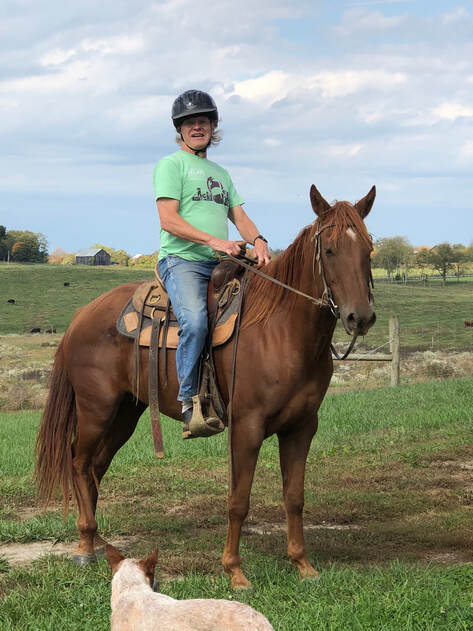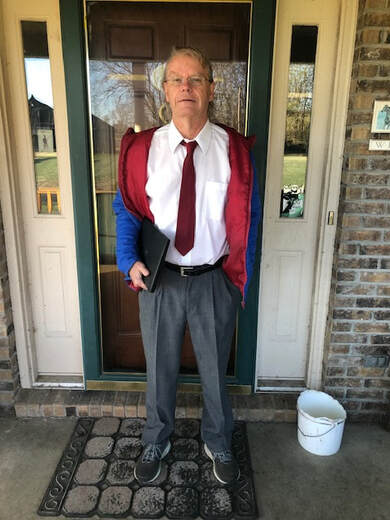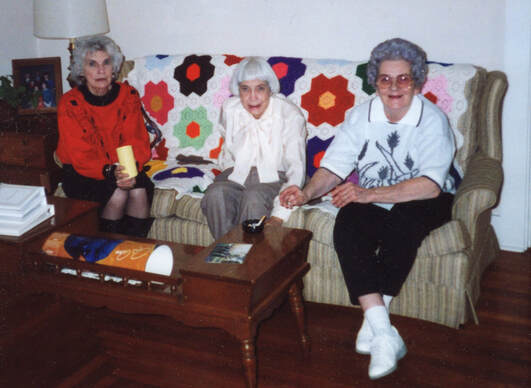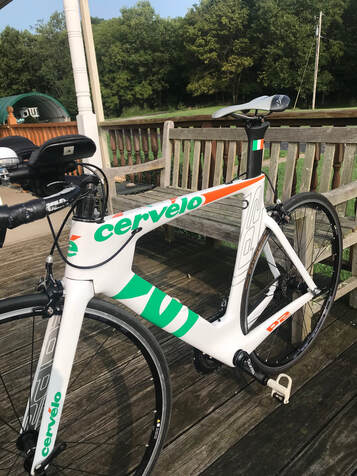 Philip on his new trail horse, October 2020. Philip on his new trail horse, October 2020. Philip Cullen was irrepressible. If he wasn’t racing, he was volunteering at a race. Or officiating. If he wasn’t focusing on triathlons, he was fooling around with trail running or Ride & Tie events—at least until an unfamiliar horse got the better of him last spring. So Maureen gave him his own horse when he retired this past fall so they could trail ride together. At triathlons, he usually attached a stuffed animal to the front of his bicycle just to give all the serious racers around him a laugh. He was good, and I imagine the sight of Philip passing with a stuffed tiger on his bike gave his competition motivation to pass him later. He didn’t care. He trained with discipline and he wanted to race well for the Irish National Team, but the focus was always on fun. What surprised me most about Philip was the volunteering he did. He always volunteered to work the polls on voting day. He volunteered at every area triathlon he did not participate in. He helped coordinate training tris. He led the Tri Club. In just the last six months, I know that he volunteered to get jabbed in the J&J COVID vaccine trial back in November; volunteered to help with traffic and statistics at COVID testing sites; volunteered with the Red Cross assessing flood damage to homes in Eastern Kentucky this spring; and volunteered at the Big Turtle race in Morehead, Ky., in April, where he had planned to complete a 50K trail run before those niggling chest pains caught his attention and finally sent him to the doctor the day before.  Philip's wife, Maureen, took this photo as he headed to his last day of work at Lexmark. Philip's wife, Maureen, took this photo as he headed to his last day of work at Lexmark. And, of course, it was only recently that Philip stopped working. He used to come out to our place after work, swim a mile and a half, have a beer, and then participate in a conference call with colleagues in the Philippines on my back patio before heading home. That’s when he didn’t have to be in China or Cebu handling business. Evenings when work wasn’t pressing, he might have a couple of beers and then start storytelling in his fading Irish brogue. I used to worry that his long stories might disturb the neighbors. But I expect they were laughing along with us. Philip had tales of killer kites in India or the heat in Singapore. His years at the rival engineering school in Louisville. His frequent trips back to Ireland and the family he discovered there. And we cannot forget his devotion to his family. He usually called me when he was on I-64 heading to Louisville to see his dad (and his mum before she died in 2018) or on I-75 to Ohio to see Maureen’s family. He was always there for them, whether helping address health issues or celebrating holidays or simply offering a helping hand. In short, his heart was bigger than most. It gleefully carried a bigger load than most. It worked at a superhuman pace for sixty full years. No wonder it needed a rest. Philip, you got more out of life than most of us ever dream of. You brought laughter and encouragement to the rest of us. You overcame injuries that might have beaten down a mere mortal. But nothing stopped you. You went full bore all the time. The lucky among us only get nine lives. You used up every last one of them. Rest in peace, my friend.
31 Comments
 My mother, Mary Marrs Goodlett, in the center; my mother-in-law, Jean Showalter, on the right; and my brother-in-law’s mother-in-law, the inimitable Woody Mountz, on the left. Photo c1990 in Paris, Ky. My mother, Mary Marrs Goodlett, in the center; my mother-in-law, Jean Showalter, on the right; and my brother-in-law’s mother-in-law, the inimitable Woody Mountz, on the left. Photo c1990 in Paris, Ky. I tend to ignore Mother’s Day. My mother has been gone 30 years. My mother-in-law has been gone just shy of 10. I’m not a mother. For me, Mother’s Day has become a nearly guaranteed quiet day with no obligations, because everyone else is engaged with family and special tributes to the mothers in their lives. And I have come to enjoy it for just that reason. This morning, however, historian Heather Cox Richardson, in her Letters from an American, wrote: “Those of us who are truly lucky have more than one mother. They are the cool aunts, the elderly ladies, the family friends, even the mentors who whip us into shape.” I, too, had “mothers” other than the one who birthed me. I considered my Aunt Charleen my second mother. My mother’s cousin, Ann McWilliams, always included us in family gatherings during the holidays and made us feel special. When I was in college, one of my piano teachers, Mimi McClellan, invited me to stay in her home one summer while I worked nearby. Each of these women, and many others, offered different perspectives on how to live life, how to embrace family, and what is truly important. I don’t remember having conversations about any of these things. I just watched them. And I pocketed the treasures offered by their examples. All of these ladies are now gone, too. I have to look to my own generation—or the ones that have followed—for role models. I imagine I can still learn a thing or two from my friends and my neighbors and my relatives who demonstrate compassion and generosity and the sort of joie de vivre that makes life worth living. I’m still trying to learn patience and acceptance and forgiveness—traits critical for all mothers, and the very traits I lack, probably in part because I never took on a maternal role. From the time my mother pulled me onto her lap when I was an out-of-control five-year-old and said, somewhat sarcastically, "I hope you have six just like you," I knew I never wanted to be a mother. And I never had any ambivalence about that. In her letter, Richardson claimed she “had at least eight mothers.” She goes on to describe one, Sally Adams Bascom Augenstern, a strong-willed widow who had lived near Richardson in her youth. Being the eldest of six siblings, Augenstern had already done her share of child-rearing by the time she was an adult. Said Richardson, “I've never met a woman more determined never to be a mother, but I'm pretty sure that plan was one of the few things at which she failed.” Today, for all you mothers who wittingly—or unwittingly—took on that important job, thank you. Those of us who lacked the courage are grateful for the burdens you bore with such grace. We are still watching, and we are still learning. |
Details
Archives
June 2023
Categories
All
|



 RSS Feed
RSS Feed